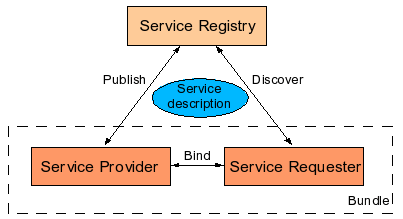OSGi framework lends independence to Eclipse plugin extensions
Apr 17, 2006 — by LinuxDevices Staff — from the LinuxDevices Archive — 7 viewsThe next release of Eclipse, version 3.2, will implement the R4.0 framework specification from the OSGi (open services gateway initiative); this framework will help developers extend plugins without creating undesirable dependencies, according to an example-filled introductory tutorial at DeveloperWorks.
The OSGi framework is a kind of registry that helps network service providers and network service consumers advertise, discover, and bind with one another.

OSGi framework model
The OSGi framework was originally developed for embedded devices in connected homes, such as set-top boxes, as well as for servers. It is maintained by the OSGi Alliance, a non-profit organization.
The OSGi framework, as used with Eclipse, appears to enable plug-in extensions to use network services conditionally, if they are available, rather than requiring or including them. The DeveloperWorks article uses the example of a plug-in extension that tracks synonyms, but can be set up to cache synonyms when told that synonym registration services are unavailable.
More information about the integration of OSGi within the Eclipse tools project can be found here. The DeveloperWorks article is here.
This article was originally published on LinuxDevices.com and has been donated to the open source community by QuinStreet Inc. Please visit LinuxToday.com for up-to-date news and articles about Linux and open source.